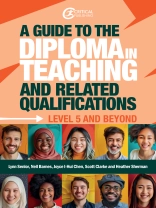This one-stop resource for trainee teachers within the Further Education and Skills Sector (FES) incorporates all the core requirements of the new Diploma in Teaching (Di T) for FES. Also, fully linked to the occupational and professional standards developed for the FE teaching landscape.
This book provides both new and existing teachers with information and support for a career in the sector, as it is fully aligned with the latest government requirements. It emphasises what it means to be a teacher, the centrality of the learner, and the need for teaching to be less about the process and more about the personal.
Content delves into a greater focus on subject-based pedagogy and on placements, as well as in-depth coverage of topics related to SEND, digital and online pedagogies, planning teaching and learning and the final assessment/viva.
For readers to engage in critical reflection and apply knowledge to practice, the text is packed with critical thinking tasks at level 5 and extension tasks for those working at levels 6 and 7. Evidence-informed practice and research also underpin each chapter.
Key features:
- Covers all level 5 and beyond qualifications for the sector, incorporating the Diploma in teaching and the Level 5 apprenticeship standards
- Maps to the sector’s occupational standards and professional standards and includes information on placements and the final assessment / viva
- Responds to the new emphases on subject pedagogy and the centrality of the learner in the learning process.
- Built in development with extensions to levels 6 and 7
- Fully embraces digital and online pedagogies.
Inhaltsverzeichnis
PART 1: INTRODUCTION
Glossary
Chapter 1 The FES sector
- A Brief history and overview of the sector
- Routes into teaching post-14 (Level 5 and above)
- Professional standards
- Occupational standards
- ATLS/QTLS
- The inspection process
PART 2 LEARNERS AND LEARNING
Chapter 2 THE FES learner
- The Learner and their characteristics
- The post 14 educational offer (BTEC, A Level, apprenticsehips etc)
- Embedding of English and mathematics
- Legal and Regulatory Practices (SEND/PREVENT)
Chapter 3 SEND in the FES Sector
- What is a SEND learner?
- Range of needs and characteristics of the SEND learner, recognizing SEND in the classroom
- Inclusive practice for the SEND Learner
Chapter 4 The emotional health of the learner
- Mental health and well-being – definitions
- Trauma informed pedagogy
- Behavioural issues such as Oppositional Defiant Disorder (ODD) and Conduct Disorder (CD)
- Anxiety,
- Depression
- Eating disorders
- Self harm
- Post-Covid issues
- Recognising and supporting young people with mental health
- Signposting
Chapter 5 The learning process
- Contemporary learning theory and neuroscience
- Role and currency of research and evidence
- Application of theory to practice
- Encouraging learners to be independent and aim high
PART 3 TEACHERS AND TEACHING
Chapter 6 The FES Teacher
- The role and responsibilities of a teacher
- What makes a good teacher?
- Working with and learning from other teachers
- Other sources of support
- The dual professional
Chapter 7 Planning for teaching and learning
- Rigorous curriculum thinking and Curriculum for inclusive practice
- Person-centred approach
- Planning and delivering sessions
- Developing inclusive resources to meet learner needs.
- Teacher expectations of learners including classroom management
- F2F and remote delivery
- Assessment and feedback
- The Reflective Teacher
- Effective Communication
Chapter 8 Inclusive teaching
- Equality, Inclusion and Diversity in teaching
- Decolonising the curriculum
CHAPTER 9 Effective digital and on-line pedagogies
- Range of Ed Tech
- AI, AR, VR etc
- Managing digital delivery
- On-Line pedagogies
- Digital technologies legal and regulatory responsibility
PART 4 PROFESSIONAL PRACTICE FOR THE TEACHER
Chapter 10 Teaching practice requirements
- Preparation for placement
- Curriculum planning and review
- Lesson planning and adaptations to include adaptive teach ing
- Planning and conducting assessment
- Using assessment to inform planning
- Assessment feedback and advice/guidance
- Application of evidence-based methods – theory into practice
- Managing and supporting learners including behaviour
Chapter 11 Teaching my subject
- Curriculum development, Pedagogic Content Knowledge (to include vocational pedagogies)
- Threshold concepts and troublesome knowledge
- Required wider/prerequisite knowledge
- Embedding maths and English
- Developing and maintaining subject expertise
Chapter 12 Education for sustainable development
- Modelling sustainable practices and sustainable development principles, values and goals in relation to your subject specialism
Chapter 13 Research and scholarship
- Evidence based practice
- Ensuring currency in subject area
- Application of research and evidence based to practice and own CPD
- Progression and further qualifications
APPENDICES
Über den Autor
Heather Sherman has 14 years‘ experience working in the secondary and FE sectors. She starting her career as a secondary history teacher, then moved into the FE sector, specialising in A Level history teaching, and mentoring PGCE students. Heather is currently the centre manager and programme leader for initial teacher education at York College, where she leads and teaches on both the pre-service and in-service Cert Ed and PGCE. Heather holds Advanced Teacher Status with SET, and is currently completing a Ph D in Education with the University of Huddersfield.












